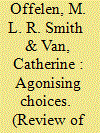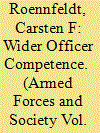| Srl | Item |
| 1 |
ID:
175536


|
|
|
|
|
| Summary/Abstract |
Tragedy is one of the oldest metaphorical lenses of International Relations. The tragic vision of politics, from Thucydides to contemporary realist theorists, lies at the core of classical realism. However, it is striking how rarely the concept of tragedy has been applied to the discourse of humanitarian intervention. This lacuna is a weakness on both the intellectual and political levels, as nowhere are clashes between competing ethical perspectives more glaring. An examination of the concept of tragedy, as conceived from its Greek origins, can illuminate an understanding of the morally contradictory imperatives created by armed intervention. Using the Bosnian War as a case study, Greek classical tragedy provides a framework to grasp the agonising choices and insoluble ethical dilemmas brought about by humanitarian intervention, in contrast to mere narratives of salvation. The argument conveyed in this article seeks to reconcile a tragic vision with the idea of progress and political action. It concludes by suggesting that the fundamental lessons that lie at the heart of tragedy should be associated with another major concept in Greek culture, namely, the Aristotelian idea of phronesis or ‘practical wisdom’.
|
|
|
|
|
|
|
|
|
|
|
|
|
|
|
|
| 2 |
ID:
163576


|
|
|
|
|
| Summary/Abstract |
Identifying and developing officer competence is important to a nation’s security and a crucial attribute of a legitimate military establishment. Critics have claimed that the U.S. officer corps favors a narrow conception of expertise that limits the armed forces’ utility as an instrument of policy. Drawing from the dialogue between Huntington and Janowitz, as well as Aristotle’s notion of practical wisdom, this article proposes a wider understanding of officer competence consisting of four distinct conceptual categories. The U.S. defense establishment favors “military skill” over other categories of competence. As a result, the officer corps is poorly prepared for 21st-century warfare. To remedy this situation, professional military education should cultivate military leaders that, in addition to military skill, have sociopolitical competence and practical wisdom. In this context, this article suggests strategies to develop such competencies that officers need to be able to achieve a diversity of national political goals.
|
|
|
|
|
|
|
|
|
|
|
|
|
|
|
|